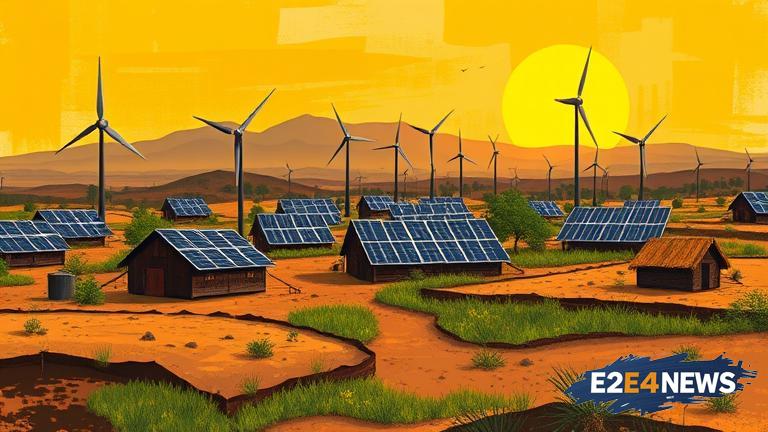Africa is undergoing a significant transformation in its energy landscape, with a growing focus on renewable energy sources such as solar, wind, and hydroelectric power. This shift is driven by the need to reduce dependence on fossil fuels, mitigate climate change, and provide access to energy for the continent’s rapidly growing population. According to recent reports, Africa has made significant strides in increasing its renewable energy capacity, with many countries investing heavily in solar and wind farms. For instance, South Africa has launched several large-scale renewable energy projects, including the REIPPP program, which aims to generate 18,000 MW of renewable energy by 2030. Similarly, Egypt has set ambitious targets to generate 20% of its electricity from renewable sources by 2022. Morocco has also made significant progress in this area, with the launch of the Noor-Ouarzazate solar power plant, which is one of the largest in the world. Other countries, such as Kenya and Tanzania, are also investing in renewable energy, with a focus on geothermal and hydroelectric power. The African Union has also launched the Africa Renewable Energy Initiative, which aims to generate 300 GW of renewable energy by 2030. This initiative has received significant support from international organizations, including the African Development Bank and the International Renewable Energy Agency. The growth of renewable energy in Africa is expected to have numerous benefits, including reducing greenhouse gas emissions, improving energy access, and creating jobs. However, there are also challenges to be addressed, including the need for significant investment in infrastructure and the development of policies and regulations to support the growth of renewable energy. Despite these challenges, the future of renewable energy in Africa looks promising, with many experts predicting that the continent will become a major player in the global renewable energy market. In fact, a recent report by the International Energy Agency predicted that Africa will become the second-largest market for renewable energy in the world by 2030. This growth is expected to be driven by the increasing demand for energy, as well as the falling costs of renewable energy technologies. The development of renewable energy in Africa is also expected to have significant economic benefits, including the creation of jobs and the stimulation of local economies. Furthermore, the growth of renewable energy is expected to improve energy access, particularly in rural areas, where many communities currently lack access to electricity. In addition, the use of renewable energy is expected to reduce greenhouse gas emissions, which will help to mitigate the impacts of climate change. The African continent is also rich in renewable energy resources, including solar, wind, and hydroelectric power, which will provide a significant opportunity for growth and development. Overall, the growth of renewable energy in Africa is a positive trend that is expected to have numerous benefits for the continent and its people. The development of renewable energy will require significant investment and support from governments, international organizations, and the private sector. However, with the right policies and investments in place, Africa has the potential to become a leader in the global renewable energy market. The future of renewable energy in Africa is bright, and it is expected to play a major role in the continent’s economic development and growth. In conclusion, the growth of renewable energy in Africa is a significant trend that is expected to have numerous benefits for the continent and its people. With the right policies and investments in place, Africa has the potential to become a major player in the global renewable energy market.





